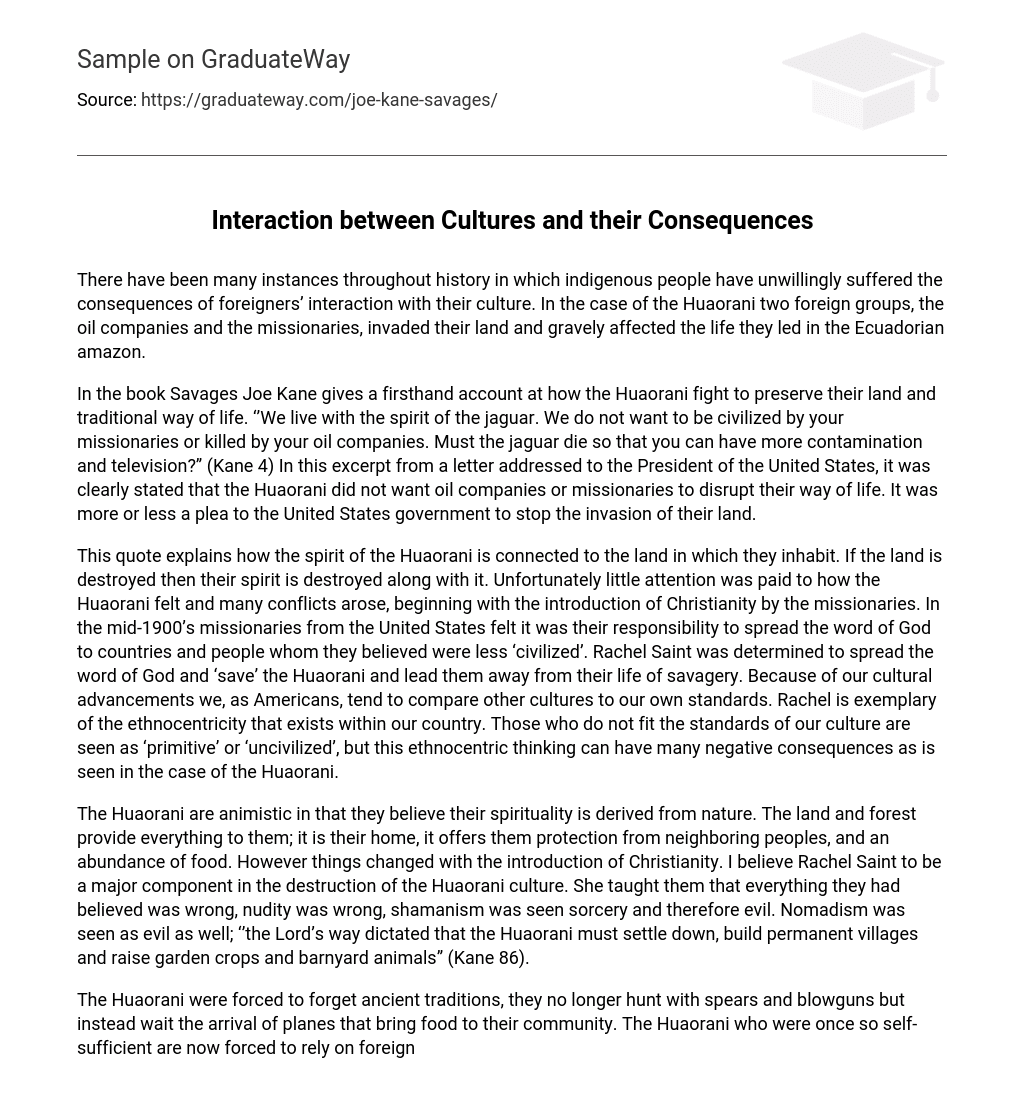The Huaorani people in the Ecuadorian Amazon have firsthand experience of enduring the negative effects of foreigners interacting with their culture. Throughout history, two foreign groups, oil companies and missionaries, invaded their land and severely disrupted their way of life.
Joe Kane’s book Savages recounts the Huaorani people’s efforts to defend their land and traditional lifestyle. In a letter directly addressed to the President of the United States, they vehemently oppose both oil companies and missionaries, proclaiming “We live with the spirit of the jaguar. We do not want to be civilized by your missionaries or killed by your oil companies. Must the jaguar die so that you can have more contamination and television?” (Kane 4). Through this correspondence, the Huaorani implore the US government to cease encroachment upon their territory, underscoring their commitment to preserving their culture and environment.
The connection between the spirit of the Huaorani and their land is explained in this quote. If the land is destroyed, their spirit is destroyed as well. However, little attention was given to the feelings of the Huaorani, resulting in various conflicts. These conflicts began when missionaries introduced Christianity in the mid-1900s. The missionaries from the United States believed it was their duty to share the word of God with less “civilized” countries and people. Rachel Saint was determined to spread Christianity and “save” the Huaorani, leading them away from their perceived savage life. This exemplifies the ethnocentric thinking embedded within American culture, where other cultures are often judged by American standards. Rachel’s actions reflect this ethnocentricity. Those who do not meet our cultural standards are viewed as “primitive” or “uncivilized,” but this mindset can have negative consequences, as seen in the case of the Huaorani.
The Huaorani people have a strong connection to nature, deriving their spirituality from it. They view the land and forest as their home, providing protection from neighboring groups and an abundance of food. However, the introduction of Christianity brought about a change. Rachel Saint played a significant role in undermining the Huaorani culture. She taught them that their beliefs were incorrect, criticizing nudity, shamanism, and nomadism as evil practices. According to the Lord’s teachings, the Huaorani were expected to settle down, establish permanent villages, and engage in agriculture and animal husbandry.
The Huaorani have had to abandon their ancient traditions, no longer using spears and blowguns to hunt. Instead, they now rely on planes to bring food to their community. This reliance on outsiders for their meals has greatly impacted the once self-sufficient Huaorani culture. Their health has also suffered, with many Huaorani experiencing diabetes due to the excessive amounts of processed sugar in “civilized” food. Additionally, the education provided by missionaries has eroded their already limited culture and traditions, forcing the Huaorani to change their way of life. The inevitability of change is acknowledged, but the real concern is how that change occurs. The Huaorani, like all people, have the basic moral right to evolve their own cultural tools for managing change, instead of having it imposed upon them (Kane 75).
The Huaorani territory experienced significant changes caused by oil exploration and extraction, environmental degradation, and the arrival of new settlers seeking land and employment. Jose Miguel, a long-term resident, emphasizes the importance of allowing the Huaorani to actively participate in shaping their own future. However, it is essential to examine both the Huaorani’s previous and current ways of life to determine if they have been considered during this process.
During a trip with a member of the Huaorani tribe, Kane observes the oil-soaked roads as they drive into the forest. However, his attention shifts towards the breathtaking sight in the distance – an ‘arboreal quiltwork’ consisting of countless shades of green. This leaves the author in awe. In response, the Huao utters the word ‘abundancia’. The Huaorani tribe holds a deep reverence for the land, which others may struggle to comprehend. They believe that their existence is intertwined with the spirit of the forest and the animals that inhabit it, living in perfect harmony. Rather than possessing the land, they see themselves as sharing in its abundance.
The Huaorani people place great value on self-reliance, with their culture centered around food, rituals, and feasts. Unfortunately, this way of life has been disrupted by famine and the actions of oil companies. The Huaorani believe in the concept of ‘abundancia’, where the forest always provides for them. However, the construction of new pipelines required the clearance of forests, displacing many Huaorani individuals and eliminating their primary food source. Moreover, numerous oil spills have contaminated rivers and lands, rendering them unusable for the Huaorani. Not only has the environment been damaged, but also Huaorani culture itself. In order to meet their basic needs and address illnesses caused by the oil companies, the Huaorani have been forced to abandon their traditional way of life and work for the oil companies.
The Huaorani people have experienced significant impacts on their way of life from both oil companies and missionaries. Oil spills, deforestation, pipeline operations, and the spread of Christianity have had more influence on the Huaorani than they could have imagined. These foreign entities, particularly the missionaries, have caused ethnocide among the Huaorani and forced them to abandon their traditional lifestyle to conform to Western standards. The intrusion of missionaries and oil companies has led many Huaorani, like Enqueri, to succumb to the empty promises of companies such as MAXUS in exchange for money and material possessions. As a result, the Huaorani find themselves torn between preserving their cultural heritage and adapting to their current reality.





